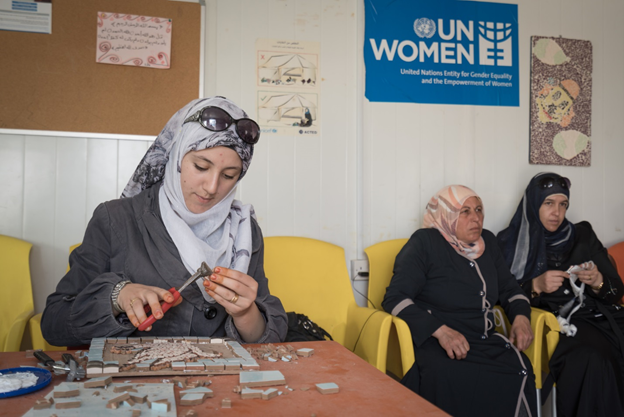Voices of women survivors of violence: Alaa’s “wedding”
Date:

Alaa in a mosaic workshop in UN Women’s women center (Oasis) in Zaatri Refugee Camp. Photo: UN Women/ Christopher Herwing
Two years after her marriage at 15, Alaa already has a little girl, a husband and a new baby on the way. They live together in a small caravan in the Zaatri Refugee Camp in Jordan, where she can’t fit a bed.
“If I was in Syria, I would have continued my education to become a school teacher”, Alaa said with a small smile, “But here, there is no hope.”
Having left school upon her marriage, Alaa is still trying to build a life for herself through participating in cash for work programmes provided by UN Women’s women centres in the camp. But her life remains very different from what she had once envisioned for herself before the war.
Her dream of a class of children to teach came to an end when a shelling just outside her village killed six people. Alaa’s family then decided to flee the country in November of 2012. Alaa was already too familiar with violence before that. Her mother, who also married at 15, was divorced before Alaa was born and, as per tradition, Alaa could not live with her mother after she married for a second time. She lived with her uncles and grandmother instead.
“I had a very difficult life with my uncles,” Alaa said, “they were too controlling and never loved me as well as they loved their children.”
The trip to Jordan was difficult, but Alaa believed it was necessary. News had started spreading that young women were being kidnapped, locked away and raped. A cousin of Alaa’s who went to college in the city told the family a colleague of hers was taken from campus.
“Sometimes the women came out of jail pregnant depending on how long they stayed inside,” Alaa recalled, “This is what really scared us, more than the bombings.”
Alaa is one of scores of Syrian women refugee who report fear of sexual violence as a major motivation to flee the country. So, one winter night, Alaa packed one change of clothing in her school back bag and walked to the border with her family. They thought they would only stay away for a week and come back when the fighting in their village is over. But soon they realized they would be staying longer than they had originally anticipated when one of Alaa’s uncles who stayed behind was killed in the fighting.
Alaa went to school in the camp until, only a few weeks after her arrival in Jordan, three sisters who lived nearby were kidnapped and raped. The little one, a 6 year old girl, was killed in the process. Alaa’s family banned her from leaving the residence and she stopped going to school for six weeks. When the talk about the incident started to die down in the camp, she was allowed to continue her schooling. But her uncles thought it was no longer too soon for her to marry. When a 23 year old neighbor proposed, they accepted and the barely 15 year-old Alaa became engaged.
“I agreed thinking we would be engaged for a long time like the tradition back in Syria when girls were engaged for two or three years”, Alaa said.
She was scared, Alaa said, because of her mother’s experience and because of the examples she saw around her of girls who marry too young and end up divorced soon afterwards. There was no shortage in such stories in the camp. While child marriage stood at 13 per cent in prewar Syria in 2011, registered marriages for Syrian girls under 18 in Jordan rose to 18 per cent in 2012 and then spiked to 25 cent in 2013.
When Alaa realized her family and her fiancée wanted a quick wedding two weeks after the engagement, she panicked and said she no longer wished to be married.
“They said to me: ‘you will create a scandal for us’. I’m always too sensitive when they shout because I lived with my uncles like an orphan,” Alaa remembered, “So I held my tongue and I married him.”
She was lucky, Alaa said with a grin, because her husband was not much older than she was and he was kind and so she loved him. Other girls she knew, however, were not as lucky.
“My friend’s father has fifteen children and is currently looking for a second wife,” Alaa said almost angrily, “He is looking for a 15 year-old. What is worse, he is going to find one.”